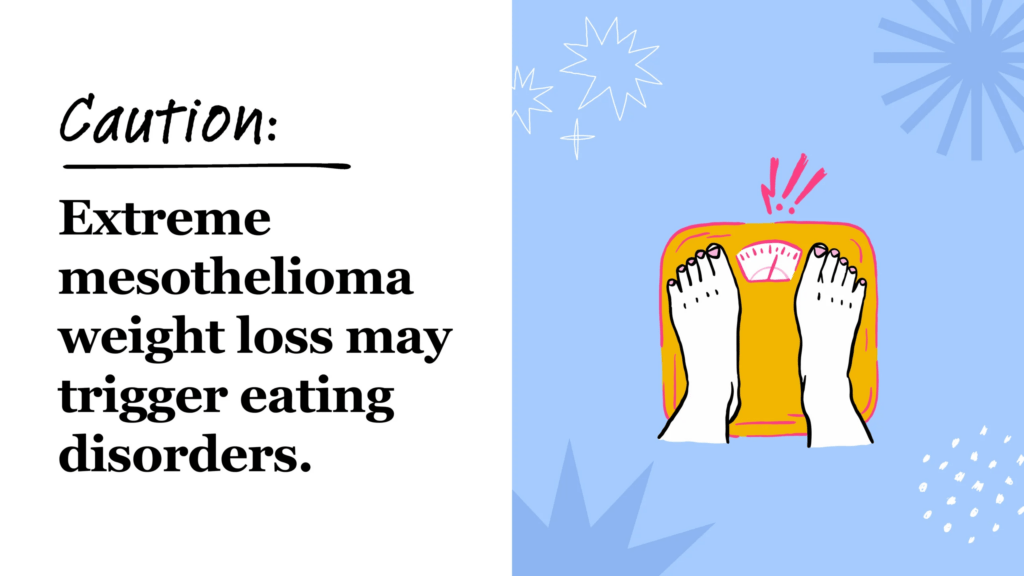Mesothelioma is a rare type of cancer that attacks the mesothelial cells. It targets the tissue surrounding vital organs like the lungs (pleural), abdomen (peritoneal), heart (pericardial), and testicles (testicular). Malignant mesothelioma is closely associated with asbestos exposure, a once prevalent material used as insulation for buildings, shipyards, and naval vessels in the 1900s. In this article we will reveal how a common side effect of mesothelioma weight loss can lead to additional disorders and conditions. 
Reasons for Mesothelioma Weight Loss
Like many types of cancer, mesothelioma can lead to unexpected weight loss. Unfortunately, this side effect is due to a loss of vitamins, nutrients, proteins, and calories that commonly tag along with a cancer diagnosis. While it might not purposely occur, weight loss can be caused by:
- Loss of appetite
- Difficulty swallowing
- Chest Pain
- Abdominal pain
Eating Disorder Caused by Weight Loss
In extreme cases of weight loss, mesothelioma cancer patients can experience eating disorders (also known as EDs). It was found by The National Library of Medicine that individuals who experience “chronic diseases are 2.4 times more at the risk of EDs and 1.9 times more at the risk of ED subgroups compared with those without the disease”. Eating disorders are defined as serious health conditions that affect both your physical and mental health” (“Eating Disorders – Symptoms and Causes”). While the disorder eats away at the body, there are psychological difficulties that can occur as well. As described by the Mayo Clinic, eating disorders “include problems in how you think about food, eating, weight and shape, and in your eating behaviors”.
Types of Eating Disorders in Mesothelioma Patients
The multitude of mesothelioma diagnoses require dietary shifts with many restrictions. This can foster an environment of difficulty and stress, strengthening the presence of an eating disorder. The most common eating disorders found in cancer patients include anorexia and cachexia.
Anorexia
Anorexia in cancer patients is different than the conventional form of anorexia as it is commonly unintentional. In this form it is recognized as a “major loss of appetite and aversion to food” (“Understanding Cancer Anorexia, Weight Loss, and Cachexia”). This is seen in more advanced stages of cancer and can cause symptoms like:
- Unusual eating activities
- Significant loss of body weight
- Fatigue
- Difficulty eating
Cachexia
Cachexia is another eating disorder that is common in cancer patients. The Cancer Network describes this condition as “a loss of body mass, including lean body mass and fat”. This disorder is also seen in more advanced stages of mesothelioma cancer. Unfortunately, signs of this condition are associated with limited survival duration. The diagnosis of cachexia is clearer to recognize than anorexia and includes:
It is important to be screened for nutritional levels and ensure a healthy diet while attending to a mesothelioma diagnosis. In the extreme cases of mesothelioma weight loss, anorexia or cachexia can become present. If you find yourself experiencing significant weight loss, food aversion, or fatigue, consult with a doctor to discuss further treatments.
In addition to this, if you or someone you know has been affected by asbestos exposure or mesothelioma in the state of Pennsylvania, please visit The Halpern Law firm for a free consultation or call (800) 505-6000 to turn today’s adversity into tomorrow’s justice.
Sources:
- Aminah Jatoi, MD. “Anorexia and Cachexia.” Cancer Network, Cancer Network, June 2015, https://www.cancernetwork.com/view/anorexia-and-cachexia. Accessed 26 Feb. 2024.
- “Eating Disorders – Symptoms and Causes.” Mayo Clinic, 2023, https://www.mayoclinic.org/diseases-conditions/eating-disorders/symptoms-causes/syc-20353603. Accessed 26 Feb. 2024.
- Hossein, Seyyed Abbas, et al. “Investigation of Eating Disorders in Cancer Patients and Its Relevance with Body Image.” Iranian Journal of Nursing and Midwifery Research, vol. 20, no. 3, 2015, pp. 327–33, https://www.ncbi.nlm.nih.gov/pmc/articles/PMC4462057/. Accessed 26 Feb. 2024.
- “Understanding Cancer Anorexia, Weight Loss, and Cachexia.” Bidmc.org, 2017, https://www.bidmc.org/about-bidmc/blogs/living-with-cancer/2020/03/understanding-cancer-anorexia-weight-loss-and-cachexia. Accessed 26 Feb. 2024.
- “UpToDate.” Uptodate.com, 2024, https://www.uptodate.com/contents/management-of-cancer-anorexia-cachexia. Accessed 26 Feb. 2024